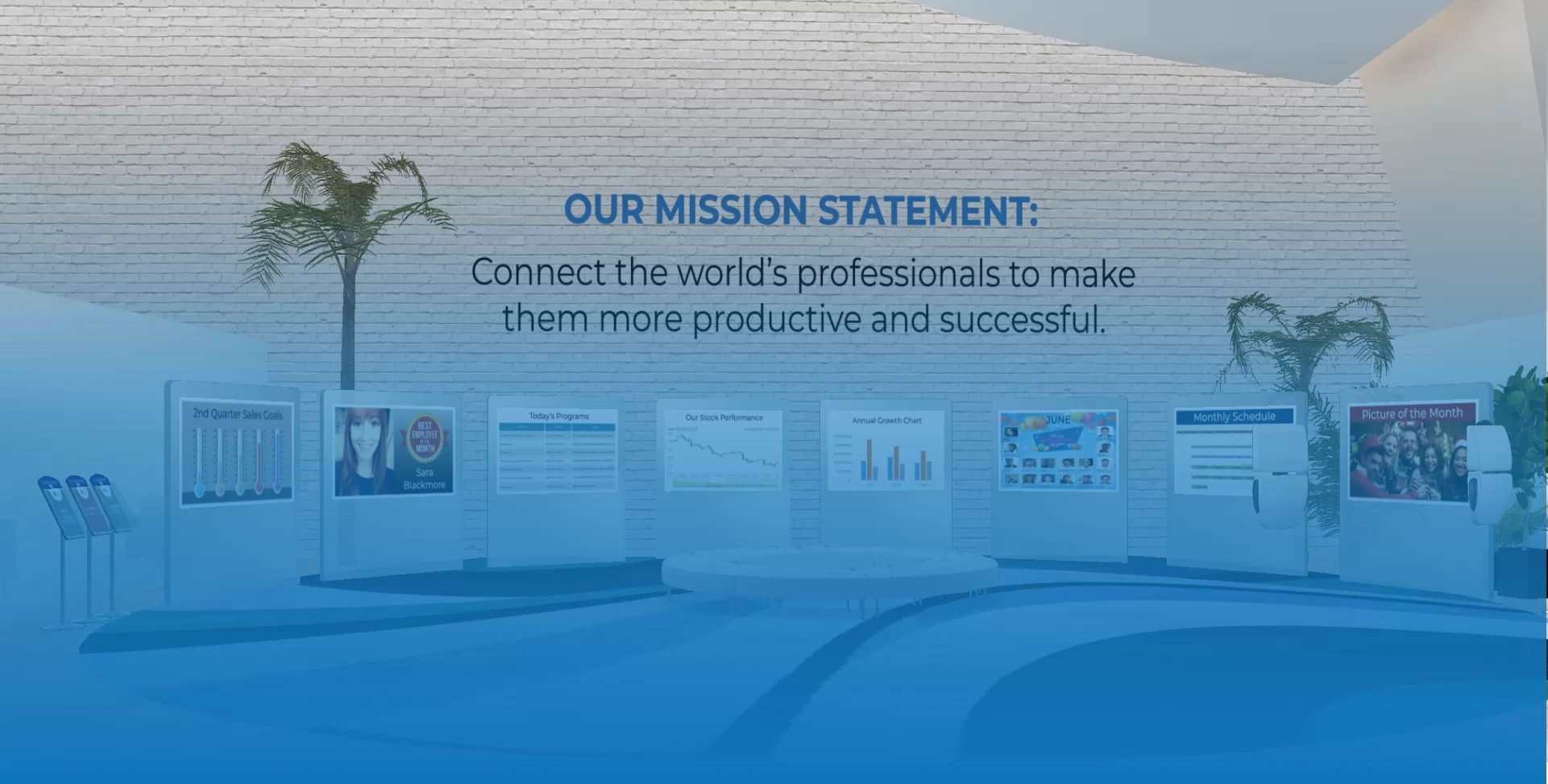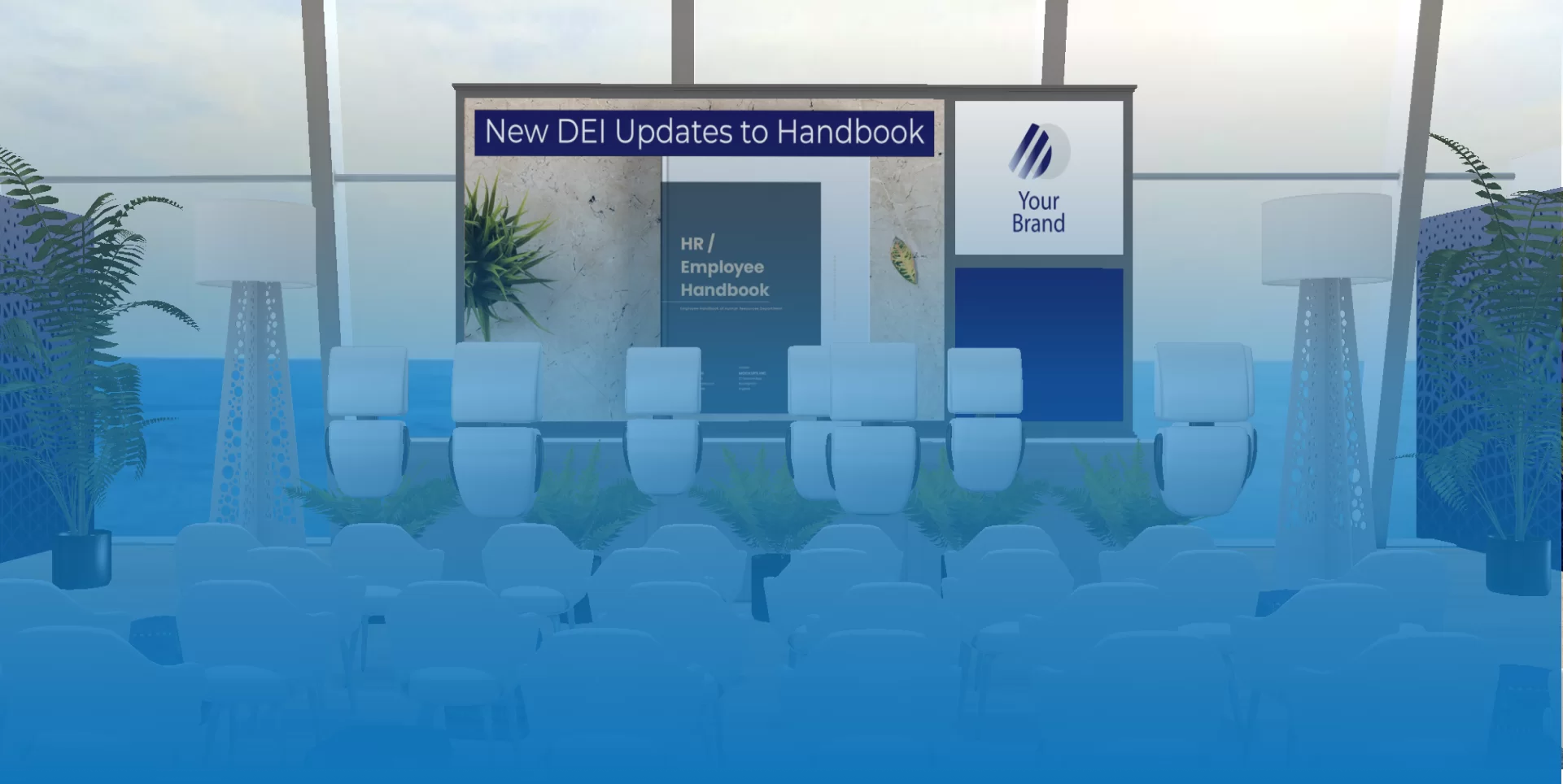
Metaverse platforms are taking immersive branding strategies to the next level – read on for inspiration about how to make this new tech environment work for you.
In 2024, the term “metaverse” will become a tangible reality, gradually expanding and evolving. It is essentially the next phase of the internet, where everything we do digitally will have a physical counterpart. The metaverse promises to be a 3D playground where you can attend lectures in a virtual Hogwarts and collaborate with coworkers in a digital co-working space modeled after your favorite coffee shop.
The metaverse is not just about the latest technology, though. It also focuses on building, owning, and connecting. Blockchain technology, which is used in cryptocurrencies, will enable the buying and selling virtual land, houses, and even clothing for your avatar.
While 2024 may not yet bring the technology to teleport to Mars, it is laying the groundwork for a future where the distinction between online and offline worlds is blurred. The metaverse presents a world filled with endless possibilities, where your imagination is the only limit. It’s an incredibly exciting prospect, wouldn’t you agree?
An immersive experience is an engagement that fully captivates our senses and transports us into a different world or reality, blurring the boundaries between the physical and digital realms. It creates a deeply engaging and memorable encounter that allows us to escape, explore, and interact with a simulated environment.
Evolving digital marketing is witnessing a transformation as businesses explore new avenues to engage target audiences. With a smooth transition into the metaverse, digital marketing is poised to revolutionize the way brands interact with customers, offering immersive marketing experiences that transcend traditional marketing boundaries.
Immersive marketing helps brands build deep and lasting connections with their consumers by tapping into customer emotions and values. Immersive marketing experiences go beyond traditional marketing by creating interactive and captivating encounters that deeply engage consumers.
Examples of immersive marketing include virtual reality tours of a hotel or venue, augmented reality apps that allow users to visualize products in their own homes, and interactive installations that offer hands-on brand experiences.
The metaverse is a transformative platform for immersive marketing experiences, enabling brands to create interconnected virtual environments where consumers can engage, explore, and interact with their products and services in unprecedented ways. As the concept of the metaverse continues to unfold, understanding its immersive experience meaning is a common endeavor.
If you find yourself in the early stages of exploring the metaverse’s workings, rest assured that you’re not alone. Brands are increasingly embracing metaverse marketing, leveraging its technology to enhance trending immersive marketing approaches that foster brand attachment and drive higher conversion rates. How? Let’s explore together!

Brands can involve their audience in marketing campaigns to build a sense of community and ownership. Encouraging influencers to participate in product vision campaigns is a surefire way to establish enduring brand connections.
Nike’s pioneering .SWOOSH Web3 platform invites customers to buy and trade virtual Nike products, join in community challenges for the chance to net exclusive access to events and gain access to new product drops, and even co-create Nike designs.
In crowdsourcing campaigns, brands involve their audiences in the decision-making by soliciting ideas, feedback, and suggestions. For instance, a beverage company might launch a crowdsourcing campaign to ask consumers to submit ideas for a new flavour, allowing them to actively participate in the creation and marketing of the product. Interactive metaverse spaces with 3D graphics offer endless opportunities for co-creation and collaboration and build emotional investment in brand affiliation.
When someone engages with your brand by creating or commenting on a post, it introduces you to that person’s social network. The Starbucks White Cup Contest invited customers to decorate their white cups and tag their posts with #WhiteCupContest.
The result was a shared space of creativity, with thousands of visually striking posts that amplified the brand’s social presence.
The many options for co-creation and collaboration enabled by metaverse platforms, make the metaverse ideal for engaging target audiences to produce user generated content, submit designs for metaverse avatar components or virtual merchandise.
One of the most powerful ways humans engage with one another is through play, and gamification has become a key pillar of immersive marketing strategy. As anyone who’s played Pokemon Go will agree, augmented and virtual reality offer brands the opportunity to bring intentional communities together through curiosity, challenge, and fun.
Brands can offer potential customers access to exclusive content and exclusive products as an incentive to play and build interest in their offerings.
Marketers ensure that the digital challenges are designed to allow users the ability to participate and have multiple chances to win or achieve success, while maintaining a healthy level of competition.

Digitally augmented product demos are poised to change the face of shopping as we know it now. Augmented reality tech allows brands to provide additional information and supplementary content when interacting with a physical object, while virtual reality and 360 degree video makes it possible to interact with a product in a totally virtual space.
Virtual reality experiences like the Lowes Holoroom take interactive product demoing one step further by providing VR-enabled instruction on diy home renovation skills, attracting customers to their store and motivating them to purchase the products they’ve had a chance to test out virtually on-site.
Meetaverse offers similar functionality without requiring specialized equipment via 3D interactive displays.
Looking for a S&M virtual space?
Leave your contact information and a Meetaverse professional will be happy to tell you more about how we can help
The future of immersive brand experience events definitely includes the metaverse. Attendees can engage with a whole set of immersive marketing techniques, while avoiding the carbon costs of in-person attendance. Additionally, dedicated virtual environments can remain active after an event’s conclusion to encourage evergreen engagement with sponsors and stakeholders.
Sephora took their virtual event presence beyond the webinar when they partnered with Meetaverse to produce Unwind With Beauty, a virtual event featuring daily interactive live events and a photo booth.
While hybrid events have emerged as a result of recent technological advancements, participants attending solely through virtual means have struggled to truly feel connected with the group. The potential of metaverse technology offers hope in addressing this challenge.
Remote attendees can more fully participate through immersive experience metaverse as opposed to viewing live streaming events on their screen.
Inclusive marketing is a strategic approach that aims to create campaigns and messages that resonate with diverse audiences, promoting representation, equality, and inclusivity.
The interactive and participatory nature of metaverse environments makes them a natural fit for inclusive marketing pushes, as Clinique’s Metaverse More Like Us campaign demonstrates. Diverse makeup artists partnered with Clinique and Daz 3D to create an NFT makeup collection celebrating diversity in beauty.
Immersive experiences powered by the metaverse mean that you can reach more people – and user generated content can add to the diversity of representation as well.
Metaverse spaces enable opportunities for interactive storytelling where the brand’s identity can be co-created through a diversity of voices. As human-centered design in marketing comes to the fore, influencer marketing will take on new, dynamic forms.
Potential customers want to experience agency when they interact with brand content. Location-based marketing can engage tech augmentations to achieve emotional marketing success. Coca-Cola’s “Hug Me” campaign played on the idea of gesture-based marketing by encouraging passersby to hug the dispenser to receive a free Coke, encouraging emotional connection and user-generated social media content.
Experiential pop-up events can be nested within a broader metaverse-supported brand presence – for instance, a virtual screen documenting IRL interactions could be enabled in a Meetaverse campus space to provide another way to build brand community.
360-degree videos offer an immersive experience that evoke a strong sense of presence, surpassing the impact of traditional video content.
Thomas Cook Travel’s “Try Before You Fly” campaign allowed prospective travellers to virtually explore the interior of their aircraft, enhancing engagement through a contest that rewarded viewers for identifying hidden clues.
Embedded into metaverse environments, 360-degree video immersion offers another way for marketers to create a fuller experience of their brand.
Meetaverse can provide a 3D virtual experience that doesn’t require any special tech. Be on the lookout for wearable technology marketing advances to accelerate opportunities for immersive interactive experience.
Social commerce describes purchases that take place without the customer leaving the social media network where they encountered the brand and its community.
Algorithm insights help get the right product in front of the right person at the right time and helps brands deploy emotional marketing strategies up to the point of sale.
Brands can enter the metaverse through emotional marketing strategies by focusing on creating meaningful connections and experiences that evoke strong emotions within users, leveraging immersive storytelling, personalization, and interactive elements to forge deep and lasting relationships in the virtual realm.
The Forever 21 + Roblox Shop City takes brand community building one step further as enthusiasts enjoy virtual spaces and the opportunity to compete to build the best store.
Currently, metaverse environments only permit payment through blockchain.
Transactional integration with financial institutions is not yet available. Once it is, savvy brands will move and gain an edge over those sticking with conventional Web 2.0 ecommerce models.
Immersive digital experiences can help brands achieve their sustainability goals. Consumers’ ability to directly try goods before purchase translates into less waste and less returns, reducing overproduction as well transportation carbon costs.
Applications like Ikea Kreative allow customers to play with design ideas, engaging them in product discovery. Metaverse environments will enhance these advantages.
Moreover, for reaching customers at events, the metaverse offers a way to replicate the in-person experience virtually, removing the need for environmentally costly air travel.
AI-powered personalized marketing refers to the use of artificial intelligence algorithms and data analysis to tailor marketing efforts to individual consumers, delivering customized content.
Role of AI in the metaverse is pivotal starting from powering intelligent virtual environments, enabling personalized experiences, facilitating seamless interactions, and driving innovative applications such as virtual assistants and dynamic content generation.
Artificial intelligence in the metaverse creates a number of options to diversify metaverse immersive experience.
This approach enables brands to create targeted and highly relevant marketing experiences that resonate with customers, ultimately driving engagement, conversions, and customer satisfaction.
AI chatbots that guide visitors through a metaverse space can also answer product questions, and potentially make recommendations. Metaverse and AI create a much more immersive experience than a Web 2.0 online store offers and unlocks voice-based marketing possibilities.
To leverage augmented reality experiences in the metaverse, brands can develop interactive virtual try-on features for clothing or cosmetics, virtual tours of real estate properties or tourist destinations, and gamified experiences that blend digital objects with the physical world, enhancing user engagement and immersion.
Augmented reality experiences engage potential customers by layering digital content over the physical world, with savvy marketers integrating QR codes and NFC-enabled marketing into digital out of home marketing schemes.
Lexus’s Wired Magazine campaign incorporated NFC tags that lead to digital content, thus amplifying engagement.
These tactics could be used to draw clients into a metaverse environment where experiential and auditory-based marketing can reinforce brand attachment for virtual reality experiences.
There are various trends in digital marketing that are available to customers and will play a crucial role in future marketing strategies.
The metaverse can offer clients an array of immersive experience marketing trends, including virtual reality experiences, augmented reality campaigns, interactive storytelling, and gamification, enabling brands to deliver captivating and personalized engagements that truly transport and engage their audience and many more…
Contact us and book a demo to learn more about how you can enter the metaverse environment that will supercharge your brand strategy by creating compelling best immersive experiences.
Looking for a S&M virtual space?
Leave your contact information and a Meetaverse professional will be happy to tell you more about how we can help
Immersive marketing techniques refer to strategies that deeply engage and captivate audiences by creating interactive and multi-sensory experiences.
These techniques can include virtual reality (VR), augmented reality (AR), 360-degree videos, gamification, haptic feedback, and interactive installations, among others, allowing brands to create memorable and impactful interactions that go beyond traditional marketing approaches.
One example of immersive marketing is a beverage company creating a pop-up installation with interactive displays and sensory elements that allow customers to experience the brand’s story and flavours firsthand.
Another example is a car manufacturer utilizing virtual reality (VR) to provide customers with virtual test drives, allowing them to explore the vehicle’s features and experience the thrill of driving without being physically present.
One major trend in digital marketing for 2024 is the continued growth and importance of influencer marketing, with brands collaborating with niche and micro-influencers to create authentic and targeted content that resonates with specific audiences.
Another trend is the rise of voice search optimization, as more consumers embrace voice assistants and smart speakers, prompting brands to optimize their content and strategies to cater to voice-based search queries and commands.
Two of the latest top trends in digital marketing include the increased utilization of artificial intelligence (AI) and machine learning for data analysis and personalized marketing, enabling brands to deliver hyper-targeted campaigns and enhance customer experiences.
Additionally, the growing importance of social media storytelling and ephemeral content, such as Instagram Stories and TikTok videos, allows brands to engage with their audience in a more authentic and real-time manner, fostering a sense of connection and driving user engagement.
The next big wave of digital marketing is expected to be the integration of virtual reality (VR) and augmented reality (AR) experiences into marketing campaigns, providing immersive and interactive brand interactions that captivate audiences.
Additionally, the rise of data privacy concerns and regulations will shape the future of digital marketing, emphasizing the importance of ethical data practices and transparent communication with consumers.
The immersive metaverse refers to a virtual reality environment that offers users a fully immersive and interactive experience, blurring the lines between physical and digital realities and enabling social interactions, entertainment, and commerce.
With the transition from Web2 into Web3 and the advent of the metaverse, the Chi...
read moreUnlock the metaverse’s potential for business brands with our detailed gui...
read moreIn the changing digital world, Metaverse Marketing is a new way to market....
read more

